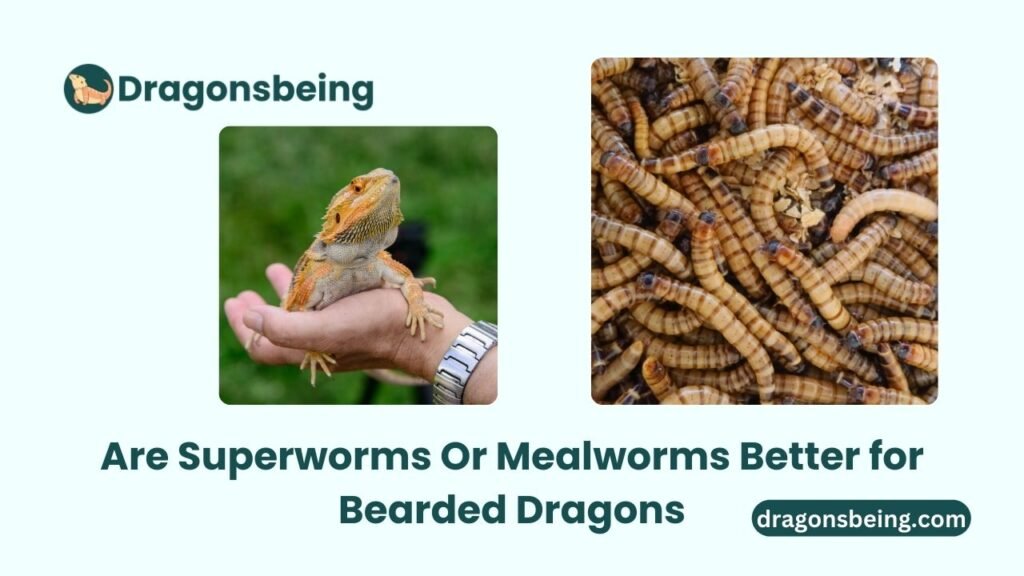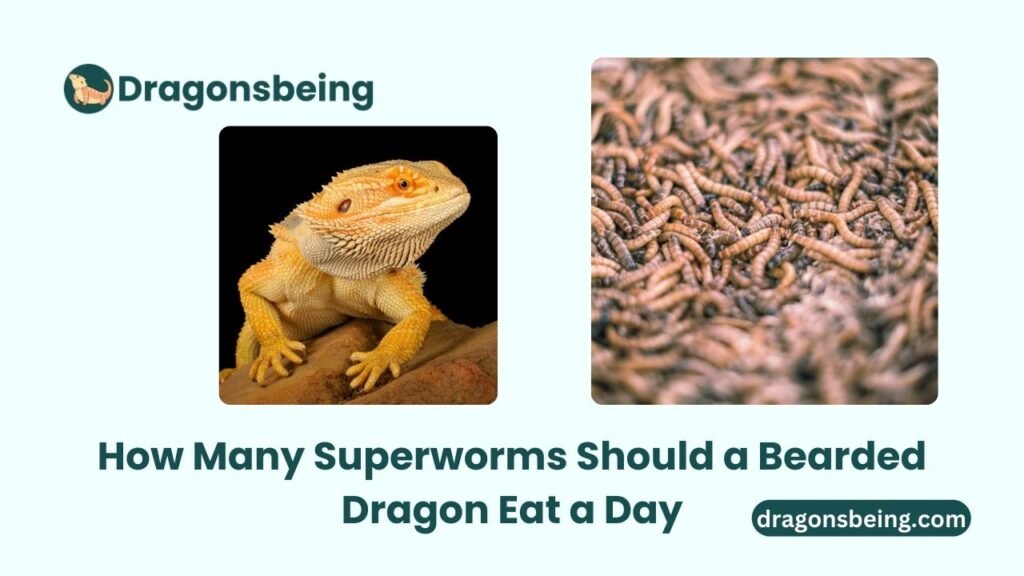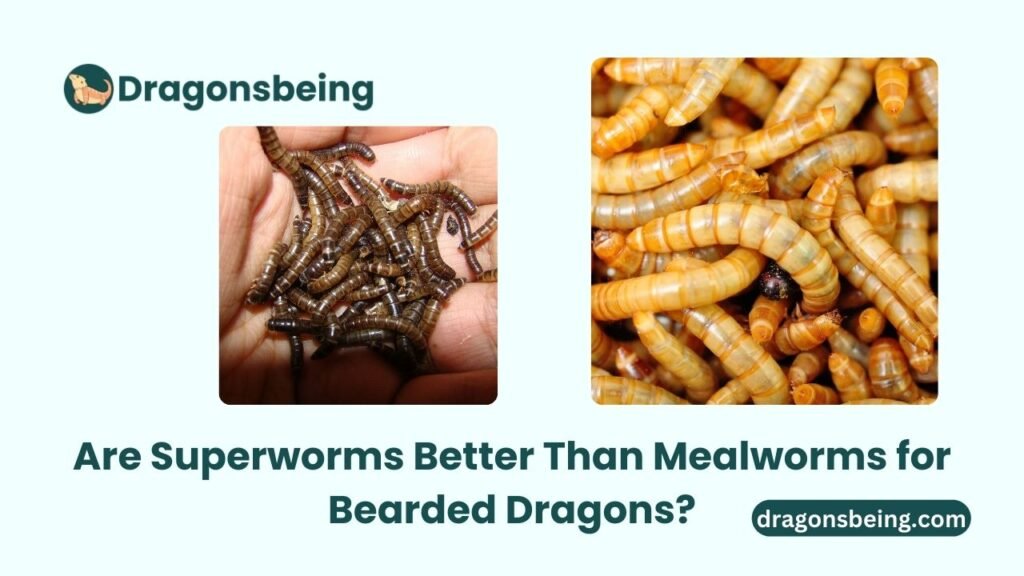Superworms are often considered better for bearded dragons due to their higher fat content and larger size. Mealworms, while nutritious, can be harder for young dragons to digest.
Bearded dragons thrive on a varied diet that includes insects, vegetables, and fruits. Among popular insect choices, superworms and mealworms stand out.
Superworms are larger and provide more protein, making them a suitable option for adult bearded dragons.
Mealworms, smaller and easier to digest, are better for younger dragons but have lower nutritional value.
Both worms can be part of a balanced diet, but understanding their differences helps in making informed choices for your pet’s health.
Choosing the right worm can enhance your bearded dragon’s growth and overall well-being.
1: Superworms
Superworms are a popular choice for feeding bearded dragons. Their nutritional profile plays a crucial role in your pet’s health. Let’s dive deeper into the specifics of superworms.
Caloric Content And Fat
Superworms contain a moderate amount of calories. This is essential for energy levels. Here’s a quick overview:
| Nutrient | Amount per 100g |
|---|---|
| Calories | 250 kcal |
| Total Fat | 15 g |
The fat content in superworms is relatively high. This can be beneficial for energy but should be balanced. Too much fat can lead to obesity in bearded dragons.
Protein And Other Vital Nutrients
Superworms are an excellent protein source. Protein supports growth and muscle development. Here are the details:
- Protein: 20 g per 100g
- Calcium: 0.3 g
- Phosphorus: 0.2 g
These nutrients help maintain strong bones and overall health. The protein aids in muscle repair and growth. Superworms also provide essential vitamins.
In summary, superworms offer a balanced nutrition profile. They serve as a great protein source for bearded dragons. The key is moderation in feeding.
2: Mealworms
Mealworms are a popular choice for feeding bearded dragons. These small larvae are packed with nutrients. They provide essential proteins and fats. Let’s explore their nutritional benefits and potential risks.
Basic Nutritional Facts
Understanding the nutrition of mealworms helps in choosing the right diet. Here’s a breakdown of their key nutritional components:
| Nutritional Component | Amount per 100g |
|---|---|
| Protein | 20-25g |
| Fat | 10-15g |
| Fiber | 2-3g |
| Calcium | 10-20mg |
| Phosphorus | 100-200mg |
Mealworms offer a high protein content. This is vital for growth and energy. They are also a source of healthy fats. However, they have low calcium levels.
Risks And Considerations
Feeding mealworms has some risks. Be aware of the following points:
- High Fat Content: Too much fat can lead to obesity.
- Calcium-to-Phosphorus Ratio: This ratio is important for bone health.
- Chitin Shell: Mealworms have a tough outer shell. This can be hard for some dragons to digest.
- Variety is Key: Relying solely on mealworms is not advisable. A balanced diet includes vegetables and other insects.
Monitor your bearded dragon’s health closely. Adjust their diet as needed. This ensures they stay healthy and happy.
Digestibility And Impact On Digestive Health
Understanding the digestibility of superworms and mealworms is crucial for bearded dragons. Digestive health impacts their overall well-being. Choosing the right worm type can enhance nutrient absorption and prevent digestive issues.
Chitin Content In Worms
Chitin is a tough substance found in the exoskeleton of insects. Both superworms and mealworms contain chitin. The amount of chitin affects how easily bearded dragons can digest these worms.
- Superworms: Higher chitin content.
- Mealworms: Lower chitin content.
High chitin levels can make digestion harder for bearded dragons. This may lead to blockages and discomfort.
Effects On Bearded Dragon Digestion
The digestive system of bearded dragons is sensitive. Choosing the right worm can benefit their health.
| Worm Type | Digestibility | Impact on Health |
|---|---|---|
| Superworms | Moderate | Potential digestive issues |
| Mealworms | High | Better overall health |
Mealworms are easier to digest. They provide better nutrition with less risk of digestive problems. Superworms may cause issues if fed too often.
Bearded dragons thrive on a balanced diet. Mix different food types for best results. Monitor their health closely after feeding either worm type.
Feeding Frequency And Quantity
Understanding the right feeding frequency and quantity is essential. It helps maintain a healthy diet for your bearded dragon. Both superworms and mealworms have unique feeding guidelines. Knowing these can ensure your pet thrives.
Superworms As Occasional Treats
Superworms should be given as occasional treats. They are higher in fat than mealworms. Too much fat can lead to obesity. Here’s a quick look at how often to feed them:
| Age of Bearded Dragon | Feeding Frequency |
|---|---|
| Juveniles (0-6 months) | 1-2 times a week |
| Adults (6+ months) | 1 time every 1-2 weeks |
Superworms can be entertaining. They are active and wriggly. This can stimulate your dragon’s hunting instincts.
Mealworms In Daily Diet: Pros And Cons
Mealworms can be a part of your bearded dragon’s daily diet. They are easier to digest than superworms. Here are the pros and cons:
- Pros:
- Lower in fat
- Good source of protein
- Readily available
- Cons:
- Harder exoskeleton
- May cause impaction if overfed
- Less nutritious than other insects
For mealworms, consider these guidelines:
- Juveniles: Feed daily, 10-15 mealworms.
- Adults: Feed every other day, 5-10 mealworms.
Balance is key. Mix mealworms with other insects for variety. This keeps your bearded dragon healthy and happy.
Risks Of Overfeeding
Feeding your bearded dragon is crucial for its health. Choosing between superworms and mealworms can be confusing. Overfeeding can lead to serious health risks. Understanding these risks helps you make better choices.
Obesity And Related Health Issues
Overfeeding can cause obesity in bearded dragons. This leads to various health problems:
- Fatty liver disease: Excess fat can damage the liver.
- Heart issues: Extra weight puts stress on the heart.
- Metabolic bone disease: Lack of calcium absorption occurs.
These issues can shorten your dragon’s lifespan. Regular vet check-ups are essential to monitor weight.
Managing Portion Sizes
Control portion sizes to prevent overfeeding. Follow these guidelines:
- Feed insects no larger than the space between the dragon’s eyes.
- Limit feeding to 1-2 times per week for superworms.
- Offer mealworms sparingly, as they are higher in fat.
Use a feeding schedule to keep track. Adjust portions based on your dragon’s activity level. Always provide fresh vegetables to balance the diet.
| Insect Type | Recommended Feeding Frequency | Notes |
|---|---|---|
| Superworms | 1-2 times a week | High in fat, monitor closely |
| Mealworms | Occasionally | Higher fat content; use sparingly |
Remember, variety is key. Incorporate other protein sources like crickets. Healthy feeding habits lead to a happy, active bearded dragon.
Life Stage Considerations
Understanding the dietary needs of bearded dragons at different life stages is crucial. Juveniles and adults have varying nutritional requirements. Choosing the right feeder insect can greatly impact their health.
Dietary Needs Of Juveniles Vs. Adults
Juvenile bearded dragons require more protein than adults. Their growing bodies need ample energy and nutrients. Mealworms and superworms provide different benefits.
| Life Stage | Protein Requirement | Insect Type |
|---|---|---|
| Juvenile | High (20-30%) | Superworms recommended |
| Adult | Moderate (15-20%) | Mealworms preferred |
Juveniles benefit from superworms due to their higher protein content. These insects support rapid growth. Adults thrive on mealworms, which offer balanced nutrition.
Adjusting Feed According To Growth
As bearded dragons grow, their feeding routine should change. Monitor their growth closely. Adjust the type and quantity of insects accordingly.
- Juvenile: Feed 2-3 times a day.
- Adult: Feed 1-2 times a day.
- Growth Spurt: Increase protein intake during this phase.
Keep track of their weight and activity levels. A healthy dragon is active and alert. Consult a vet for personalized advice based on specific needs.
Supplementation And Balanced Diet
Feeding a bearded dragon requires careful planning. A balanced diet is key for their health. Superworms and mealworms offer different nutritional benefits. Proper supplementation can enhance their diet further.
Calcium To Phosphorus Ratio
The right balance of calcium and phosphorus is crucial. Bearded dragons need more calcium than phosphorus. An ideal ratio is 2:1. Here’s a quick look:
| Worm Type | Calcium (%) | Phosphorus (%) | Ratio |
|---|---|---|---|
| Superworms | 0.03 | 0.17 | 1:5.67 |
| Mealworms | 0.06 | 0.18 | 1:3 |
Superworms have a higher phosphorus level. This can lead to calcium deficiency. Mealworms have a better ratio but still require supplementation.
Vitamin Supplements For Optimal Health
Bearded dragons need vitamins for growth and health. Vitamin D3 is essential for calcium absorption. Consider these supplements:
- Calcium Powder: Use with every feeding.
- Vitamin D3: Important for calcium absorption.
- Multivitamin: Provide once a week.
Offer supplements in small amounts. Over-supplementation can cause health issues. Monitor your dragon’s health closely. A balanced diet prevents nutritional deficiencies.
Live Feed Vs. Dried Preparations
Choosing between live feed and dried preparations for bearded dragons is essential. Both options have unique benefits and drawbacks. Understanding these can help you make the best choice for your pet’s diet.
Pros And Cons Of Live Feeding
Live feeding offers several advantages:
- Natural Behavior: Bearded dragons instinctively hunt live prey.
- Nutrition: Live worms retain more nutrients.
- Excitement: Live feed stimulates your dragon’s interest in eating.
However, there are some downsides:
- Risk of Escape: Live worms can escape and create a mess.
- Hygiene Concerns: Live feed can carry parasites.
- Availability: Finding live worms may be difficult in some areas.
Convenience Of Dried Worms
Dried preparations offer notable convenience:
- Storage: Easy to store and has a long shelf life.
- No Mess: No escapees to worry about.
- Easy to Measure: Portion control becomes simple.
Consider some drawbacks:
- Nutrient Loss: Dried worms may lose some nutrients.
- Lack of Excitement: Less stimulating for your dragon.
- Less Natural: Dried worms do not mimic natural behavior.
| Aspect | Live Feed | Dried Preparations |
|---|---|---|
| Nutrition | High | Moderate |
| Convenience | Low | High |
| Stimulation | High | Low |
| Hygiene | Lower | Higher |
Owner Experiences And Veterinary Advice
Understanding the best diet for your bearded dragon involves listening to owners and veterinarians. Their experiences provide valuable insights. Many owners share their journeys with either superworms or mealworms. Let’s explore their stories and expert advice.
Anecdotal Success Stories
Many bearded dragon owners have shared their success stories. Here are some common themes:
- Superworms: Owners report increased energy levels.
- Mealworms: Some found them easier to digest.
- Feeding Preferences: Bearded dragons often show a clear preference.
One owner noted, “My dragon loves superworms! He’s more active now.” Another shared, “Mealworms are great for my dragon. He eats them all.” These experiences highlight how individual dragons respond differently.
Expert Recommendations For Feeding
Veterinarians provide essential guidelines for feeding bearded dragons. Here are some key recommendations:
| Type of Worm | Protein Content | Fat Content | Best For |
|---|---|---|---|
| Superworms | High | Very High | Active Bearded Dragons |
| Mealworms | Moderate | High | Less Active Bearded Dragons |
Veterinarians recommend limiting superworm intake due to high fat. Mealworms are better for less active dragons. Consider your dragon’s activity level when choosing.
- Feed worms in moderation.
- Always provide fresh vegetables.
- Monitor your dragon’s weight regularly.
Owner experiences combined with veterinary advice create a balanced view. Each bearded dragon is unique. Choose what works best for your pet.
Frequently Asked Questions
Are Superworms Healthier Than Mealworms For Dragons?
Superworms have higher protein content, making them a healthier option for bearded dragons compared to mealworms.
Can Bearded Dragons Eat Both Worms?
Yes, bearded dragons can eat both superworms and mealworms, but moderation is key to prevent obesity.
Which Worms Are Easier To Digest?
Mealworms are generally easier to digest than superworms, making them a better choice for younger dragons.
How Often Should I Feed Worms?
Feed worms to bearded dragons 1-2 times a week to ensure a balanced diet.
Do Worms Affect Bearded Dragon Growth?
Superworms promote better growth due to their nutritional value, while mealworms can be less beneficial.
Conclusion
Choosing between superworms and mealworms for your bearded dragon depends on their specific needs. Both options offer unique benefits. Superworms provide higher fat content, while mealworms are easier to digest. Ultimately, variety is key to a balanced diet. Always monitor your dragon’s health and adjust accordingly for optimal well-being.

Hi, I’m Dr. Michelle Mayers, a veterinary professional with a deep passion for animal health and well-being. Over the years, I’ve dedicated my life to caring for animals and helping pet owners better understand their furry, feathered, or scaly companions. On my blog, Dragonsbeing, I share insights, tips, and stories that aim to educate, inspire, and connect with fellow animal lovers. Join me at Dragonsbeing as we explore the fascinating world of veterinary care and celebrate the special bond between humans and animals!


